ASEAN Economic
Ministers form united position on trade issues
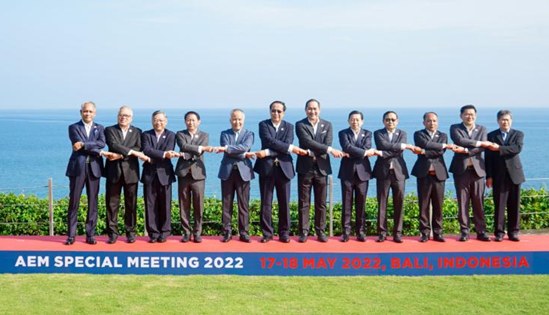
By
DTI-IDTPG-Bureau of
International Trade Relations
May 19, 2022
BALI, Indonesia –
ASEAN Economic Ministers (AEM) convened a face-to-face special
meeting, a first since COVID-19 lockdowns started two years ago, to
tackle key trade concerns of ASEAN Member States (AMS). They had
extensive discussions on challenges faced by the region and that of
individual countries brought about by global developments such as
the COVID-19 lock downs in China and the Russia invasion of Ukraine.
“We should focus on
enhancing international cooperation, going beyond trade and pursuing
other initiatives such as boosting investment, and strengthening the
rules based multilateral trading system. On the first, it is
important that we [ASEAN] strengthen economic cooperation efforts
and bring about real, and honest to goodness integration,” the trade
chief challenged.
“Most importantly at this
time, we need to ensure that there are no restrictions on trade so
as to allow the unhampered flow of goods, especially essential food,
fuel, medicines, and medical equipment," he added.
The DTI Secretary raised
this in line with concerns among AMS on recent export bans
implemented in the region such as on rice, coal and palm oil. He
highlighted the Philippine policy during the pandemic where even the
export of face masks was not banned. This led to good outcomes for
the Philippines as manufacturing capacity for medical-grade,
internationally-certified face masks expanded multiple times and
equally important, it encouraged investment in a very critical
melt-blown filter facility. He also acknowledged efforts by other
countries that have eventually removed such measures and called for
the remaining bans to be lifted.
“I thank Indonesia for
lifting the export ban on coal and studying the issue on palm oil,
including the possibility of lifting the export ban by as early as
the end of the month. We are one ASEAN, one family. We must care and
support each other as our economies and peoples become even more
closely linked,” he said.
The Ministers also agreed
to deepen economic relations with external partners such as the US
and EU. A key topic discussed was the Indo-Pacific Economic
Framework of the US (IPEF). It is the proposed vehicle for
strengthened US economic engagement in the Indo-Pacific region,
seeking to operationalize shared objectives around trade
facilitation, standards for the digital economy and technology,
supply chain resiliency, decarbonization and clean energy,
infrastructure, worker standards, and other areas of shared
interest.
The IPEF is set to be
launched by the Leaders of participating countries when US President
Biden visits the region next week. It is viewed that the objectives
of the said initiative are worth pursuing especially since it
addresses inclusive growth, supply chain resilience, and digital
trade, among others, which are key elements in crafting new
generation economic partnership.
Similar with some other
ASEAN member states (AMS), the Philippines confirmed that it will
join the discussion in IPEF, "We will continue to champion more
inclusive and diverse participation from other interested countries
in the region especially the ASEAN Member States,” the DTI Secretary
said. “Further, as we move forward with our existing and new
external engagements, we should adopt an ‘ASEAN as one’ framework
where we champion the ASEAN Community’s priorities and interests in
these other partnerships,” he added.
Ministers also exchanged
views on emerging unilateral actions related to the environment and
climate change that may potentially affect trade activities in the
region.
The trade chief shared the
experience of the Philippines, “Our President Duterte raised
concerns on efforts of some countries in applying trade and
environment requirements across the board. There has to be
considerations and more discussions on how these are to be
implemented as developing countries such as ourselves are not the
cause of climate change. We should be careful in applying these to
developing economies as they are precisely still undergoing
development and will need all the support. They also usually lack
the capacity to immediately meet climate change requirements. Let us
utilize our dialogue mechanisms with external partners to get
support on this front, especially for MSMEs, as well as call on them
to avoid applying trade measures that act as barriers against
developing economies."
Lastly, the AEM revisited
the implementation of ASEAN Industrial Projects (AIP) from the early
days of the regional grouping. The AIP was part of ASEAN’s regional
industrialization efforts that entailed resource-pooling,
market-sharing, networking, and complementation. These industrial
development projects primarily aimed to promote sharing of the
region’s vast resources and capitalize on each AMS’s comparative
advantage in order to achieve economic growth and development at
both the national and regional levels.
“We support revisiting
this program but the private sector, particularly the leading
companies in major sector should drive this. It should follow the
principle of developing an ASEAN value-chain so that various stages
of production can be distributed to several member-states to spread
the benefits of industry development. We may consider tapping the
ASEAN Business Advisory Council to look into possible projects in
critical sectors such as food, health infrastructure, climate
sustainability, and clean energy. Then let us approach this along
the lines of public-private sector partnership, with the government
responsible for providing the right business environment.” The DTI
Secretary shared. Recent legislative reforms of the Philippines,
namely, the Corporate Recovery and Tax Incentives for Enterprises
Act (CREATE Act), and amendments to the Retail Trade Liberalization
Act (RTLA), Foreign Investments Act (FIA) and Public Service Act (PSA)
are expected to put the Philippines at the forefront of investors’
interest for AIPs.
On the WTO, the
Philippines forwarded the view that other rules-based mechanisms
must be allowed to function including allowing for majority
decision-making subject to a certain floor threshold, instead of
always requiring a consensus. This may assist in solving
long-standing issues like the impasse on the selection process for
the Appellate Body.
Altogether, the Ministers
acknowledged that there would need to be concrete steps taken on the
outcomes of the discussions at the Special Meeting, and the next
steps should be pursued with haste as all these initiatives will
support post-pandemic recovery efforts across the ASEAN community.
They tasked senior officials to continue the work inter-sessionally,
in preparation for the 54th ASEAN Economic Ministers Meeting and
Related Meetings to be hosted in September 2022 by this year’s
Chair, Cambodia.
Built reservoirs
supply water to residents of Matuguinao
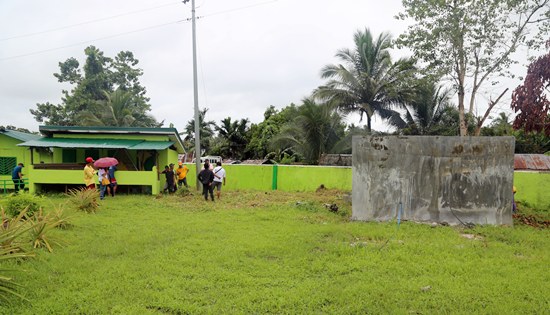
By
GISSELLE G.PARUNGAO
May 19, 2022
CALBAYOG CITY – Two
(2) barangays benefit from the reservoirs built with a total revised
contract amount of P22.51 million drawn from the General
Appropriations Act (GAA) of 2021.
Barangays Mabuligon and
Maduruto enjoy the five water tanks including its main tank built
within the vicinity where most houses are located. The water source
comes from the spring in Barangay Bag-otan where its main tank is
also located.
There are two (2) sub
tanks that are mounted in both barangays stated above. A total of
1,157 meters of six-inches pipes are used from the source to the
main tank. Another 5,157 meters of 4-inch pipes are also used from
the main tank to the sub tanks, then, 1,092 meters of 2-inch pipes
are installed from the sub tanks to the nearest households.
These far-flung areas in
the Municipality of Matuguinao is experiencing scarcity of clean and
fresh water thus, building these concrete tanks will be more
affordable, durable and healthy than any other types such as plastic
or metal. Aside from that, continuous and constant water supply is
most needed by these localities.
Philippine
Elections: A Past Revisited
Press Release
May 19, 2022
MANILA – The
International Coalition for Human Rights in the Philippines began
monitoring the recent Philippine election from the kick-off of the
campaign in February 2022. The Philippine Election 2022
International Observer Mission (IOM) was recommended by the
Independent International Investigation into Human Rights Violations
in the Philippines (INVESTIGATE PH). The IOM placed observers on the
ground from the first week of April. They meticulously documented
the unfolding campaign, the vote and the aftermath in Central Luzon,
National Capital Region (NCR), Southern Luzon, Central Visayas,
Western Visayas, and Mindanao.
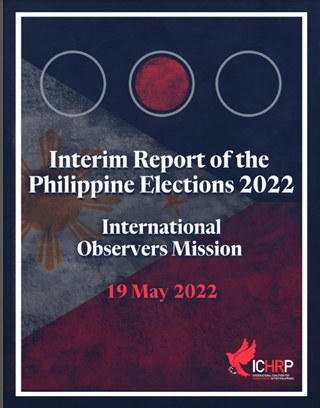 IOM Commissioner and
Belgian Parliamentarian Séverine De Laveleye said, “These elections
are extremely important to both the international community and the
Filipino people, but sadly the outcome suggests a continued drift
towards repression, state impunity and state terror”.
IOM Commissioner and
Belgian Parliamentarian Séverine De Laveleye said, “These elections
are extremely important to both the international community and the
Filipino people, but sadly the outcome suggests a continued drift
towards repression, state impunity and state terror”.
“These Philippine National
Elections 2022 were not free and fair. They were marred by a higher
level of failure of the electronic voting system than ever before,
along with rampant vote-buying, disturbing levels of state and
military orchestrated red-tagging of candidates and parties
including numerous incidents of deadly violence,” said Ms De
Laveleye.
IOM Bulletins recorded
that the main opposition candidate Leni Robredo was strenuously
red-tagged. Another Presidential Candidate Leody De Guzman was the
victim of a strafing attack at a campaign rally in Mindanao. Many
campaign activists were arrested on false charges. Large numbers of
voters were unable to cast their ballots. Vote-buying was
widespread. Many found their names were no longer on the voter roll,
and many had to trust that election officials would later put their
marked ballot paper through a Vote Counting Machine (VCM) because of
the breakdown of the voting machines.
The May 9 election did not
meet the standard of “free and fair” because voters were denied
access to reliable information, access to the voting places without
intimidation, and a credible vote counting system. The IOM reported
election-related violations of human rights from March 15, noting
the first political killings related to the elections took place in
Sorsogon, Bicol Region, on January 15.
The elections took place
in the most repressive atmosphere seen since the time of dictator
Ferdinand Marcos. The Duterte government has orchestrated state
terror, marshalling the entire machinery of the state, including the
judiciary, the military and police, the departments of education,
social welfare and local government, in a war on dissent which
continued through the entirety of the election campaign.
The results of the
election are a worst-case scenario for the Filipino people and for
the international community. The President-elect, Ferdinand
“Bongbong” Marcos Jr., says that his father’s legacy of dictatorship
were “golden years”. Marcos Sr.’s 14-year military dictatorship
ended in the 1986 People Power uprising. The Marcos family is
estimated to have stolen more than US$10 billion from the
Philippines of which only a small portion was ever recovered.
Bongbong and running mate, Vice President-elect Sara Duterte,
represent a political marriage of the families of the worst human
rights violators in Philippine history.
“Our concern is that the
declared Marcos-Duterte victory will continue to provide legal and
legislative cover for past and future human rights violations,
economic plunder and crimes against humanity,” said IOM Commissioner
Rev Dr Prof Chris Ferguson.
”The election is both a
tragedy and farce of epic Shakespearean proportions, a farce in that
the electoral charade was based on a sea of disinformation,
disenfranchisement and intimidation of large swathes of the voting
public; at the same time a tragedy in that the former dictator’s son
and entire family fortune is based on his parents’ theft of billions
of dollars from the Filipino people, and this is seen as the
solution as opposed to the problem for a country mired in poverty
and decades of brutal military control,” said Rev Ferguson.
”The priority now for the
international community should be intensified international efforts
to hold the outgoing Duterte team accountable for its abysmal human
rights record, and to increase monitoring of the incoming Marcos
administration. This work is underway at the International Criminal
Court, and in the United Nations Human Rights Council processes, and
can be pursued in national jurisdictions with Magnitsky-style laws.
There should be no hint of a blind-eye for continued human rights
violations under Marcos Jr.,” concluded Rev Ferguson.
See the
Interim Report of
the Philippine Elections 2022
SND Lorenzana
lauds THE AFP JTF-Storm for the SAFE May 2022 polls in EV
By
DPAO, 8ID PA
May 14, 2022
CAMP LUKBAN, Catbalogan
City, Samar – The National Defense Secretary Delfin Lorenzana
lauded and congratulated the members of the AFP JTF-Storm for
ensuring a Secure, Accurate, Fair, Elections (SAFE) National and
Local Elections 2022 in Eastern Visayas during his visit to the 8th
Infantry Division, Philippine Army on May 12, 2022.
Despite the threats posed
by the CPP-NPA-NDF of sabotaging and disenfranchising the polls in
Eastern Visayas, the security forces were able to thwart the attacks
and successfully perform its mandate for SAFE NLE 2022.
National Defense Secretary
Lorenzana recognized the vital role and commended the efforts of the
troops during the conduct of the polls.
“We (Department) foremost
give thanks and commendations to the 8th Infantry “Stormtroopers”
Division for the Honest, Orderly, Peaceful Elections in Samar and
Leyte islands. Talagang maganda ang performance natin jointly with
AFP forces pati na ang pulis at coast gurad, sama-sama tayo. The
cooperation of the two security agencies in an inter-agency
engagement ay very good, tuwang-tuwa sa atin ang COMELEC nagtetext
ang mga Commissioner for the good result that we had in the
election,” Secretary Lorenzana said.
Meanwhile, JTF-Storm
Commander, Major General Edgardo De Leon expressed his appreciation
with the result of the elections in the region.
“I am happy sa resulta ng
election dito sa region 8 napatunayan na fair, ang objective, safe,
accurate fair election 2022. I think na-achieve natin ang purpose...malaki
ang efforts natin na pagdeter sa mga threats na gumawa ng kaguluhan,”
De Leon said.
De Leon added that based
on their inter-agency assessment, the May 9, 2022 election is the
most peaceful in Eastern Visayas due to the collaborative efforts of
the security forces in the region.
With the said
accomplishment, Secretary Lorenzana awarded the Election Streamer
Award for Election duties to 801st Brigade, 802nd Brigade, 803rd
Brigade, and the Tactical Operations Group (TOG) 8 of the Philippine
Air Force.
Moreover, Lorenzana
commended the troops for being professional with their firm stand of
remaining apolitical and non-partisan. He also encouraged the troops
to be good public servants and be role models in serving the people
and the country.
In a separate ceremony,
AFP JTF Storm Commander, MajGen De Leon, aboard the Navy vessel BRP
Enrique Jurado (PC 371) whose crew supported the AFP JTF Storm's
election mandates in Eastern Visayas presented the Election Streamer
Award 2022.
Molding a
brighter future
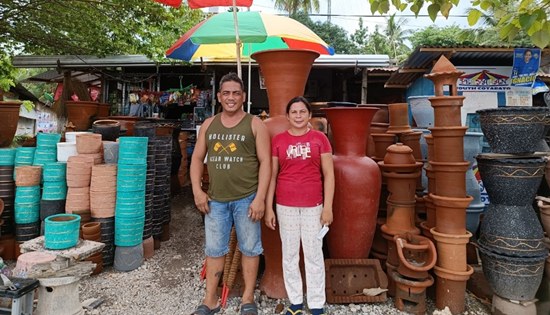
Felix
and Catherine believe that trust and perseverance are keys to
success in marriage, life and business. |
By
LYNFA A. TAN
May 10, 2022
SAN PABLO CITY –
Naturally creative and artistic, Filipinos started to make ceramic
pottery 3,500 years ago. The artistry of molding pots into household
wares and masterpieces were handed down from one generation to
another, varying from different raw materials such as clay, cement,
and metal, among others.
Felix Lumahan and his
wife, Catherine, are makers of clay and cement pots from San Felipe,
Koronadal City. They started their pottery business 15 years ago
with only P1,000 pesos. At first, it was not easy for the couple.
Because of their limited capital, they could not afford to buy raw
materials in bulk from factories. They instead bought factory defect
clay pots and repaired it with cement then painted it with bright
colors to create new designs. Their unique pots attracted buyers in
their area.
Unlike other businesses
that struggled during the pandemic, their pottery business thrived.
The number of people who made planting their hobby increased during
the implementation of lockdowns and work-from-home arrangements. Due
to a higher demand in their pots, they needed an increase in
capital.
This is where CARD, Inc.
entered the picture. Felix and Catherine availed business loans from
CARD, Inc. to fund their enterprise. They also opened a sari-sari
store to augment their income. With the support of the institution,
the couple also learned the importance of saving and the proper use
of loans.
Felix also noted how CARD,
Inc. advocates for gender equality in their provision of services, "Ang
CARD ay hindi na lamang ngayon para sa mga kababaihan, kundi ito ay
para na sa lahat, sa kahit sino na gustong makaahon sa kahirapan,
(CARD is no longer just for women, but it is for everyone, anyone
who wants to get out of poverty,)" Felix shared. CARD, Inc.
initially offered its services to landless agricultural workers but
then shifted its focus to women entrepreneurs for several decades.
Now, CARD, Inc. welcomes both men and women entrepreneurs.
Although the couple
experienced tons of hardship as a family and with their business,
their repurposed pots serve as their inspiration in their outlook in
life: broken pots can be fixed into a new and useful one.
CARD, Inc. (A Microfinance
NGO), is one of the social development institutions of CARD MRI,
which provides financial assistance through its microfinance
services. To know about their loan and service, visit their Facebook
page @CARDIncOfficial.
Massive blood
donation drive by over 18,000 church members in South Korea
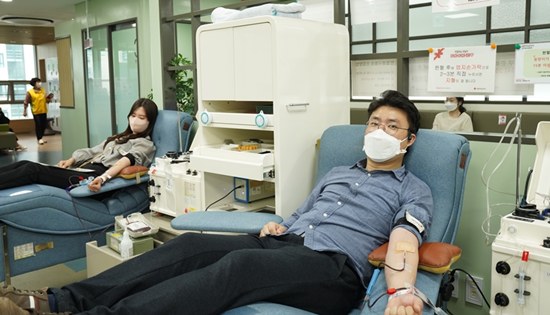
Press Release
May 8, 2022
MANILA – In order
to resolve the national blood shortage, the Shincheonji Church of
Jesus, Temple of the Tabernacle of the Testimony conducted a massive
blood donation drive in two weeks from April 18 to May 1. A total of
18,478 church members were able to donate exceeding the original
estimate of 6,000.
According to the Blood
Management Center of the Korean Red Cross, the blood donations
equate to 3.5 days' blood supply (1 day's blood supply is equivalent
to 5,029 blood donations). Due to the voluntary blood donation from
the church members, the national blood supply shortage that has been
ongoing since the beginning of this year due to the Omicron variant
has been resolved at once.
Prior to this, domestic
blood reserves were only a little over three days' supply which was
greatly insufficient compared to the proper reserve of five days’
supply and the blood supply was in a state of emergency. As of the
first day that Shincheonji Church of Jesus completed the group blood
donation, the amount of blood in Korea has risen sharply to 5.9
days.
During the early days of
COVID-19 in 2020, 6,000 church members also participated in the
donation of plasma for the development of a treatment for COVID-19
over the course of three sessions at the request of the Korea
Centers for Disease Control and Prevention. At that time, there was
no vaccine or treatment available. While suffering the aftereffects
of COVID-19 and mental health difficulties, all the members of the
church took steps to overcome the national crisis and received
attention not only at home but also abroad.
There are 16 members who
donated blood more than 100 times and the most number of blood
donations came from a member named Choi Byung-hyuk from Ulsan who
has participated 538 times so far and was inducted into the Hall of
Fame of the Blood Management Center. In addition, many young men and
women in their 20s participated in blood donation for the first time
in their lives after hearing the news of a national crisis.
All blood donations and
blood donation rights collected will be turned over to the Korean
Red Cross on May 9. Blood donation rights is a policy being promoted
by the Korean Red Cross wherein a donor can donate the amount of
blood instead of receiving a souvenir after donating. Shincheonji
Church of Jesus allowed the members who participated in the blood
donation to make the choice for themselves and the donation rights
that have been collected so far are equivalent to 100 million won.
An official from the Blood
Center said, “Many members of the Shincheonji Church of Jesus are
participating to fill up the blood supply shortage. We are reaching
our daily average target well enough, and there is no organization
that does this. What was particularly impressive was how they were
trying to gather twice as many people as eligible, considering that
there will be unqualified people among blood donation applicants. It
felt like they were working with us. Thank you very much,” he said.
An official of Shincheonji
Church of Jesus said, “It was even more meaningful because it was a
blood donation in which all the members participated with one heart.
We would like to express our gratitude to the [members] who came
running right away when they heard that the nation is suffering from
a blood shortage, and we will diligently play the role of light and
salt and live a faith life that gives glory to God.”
The Philippine Branch of
the church will also hold a blood donation drive this month of May
in collaboration with the Philippine Red Cross in Silang, Cavite.
Passage of EVIDA
to make PH more attractive for hi-tech investments

By
DTI-Competitiveness and Innovation Group
May 8, 2022
MANILA – The
Department of Trade and Industry (DTI) welcomes the enactment of
Republic Act No. 11697 otherwise known as the Electric Vehicle
Industry Development Act (EVIDA), which provides for a national
policy framework to develop the electric vehicle industry in the
Philippines.
Trade Secretary Ramon
Lopez expressed his gratitude to President Duterte and the lawmakers
for the passage of this very significant legislation.
“With EVIDA, the
Philippines is now in a stronger position to further attract hi-tech
investments and create high-value jobs in the country by taking
advantage of the ongoing global shift to EVs through strong national
policy support,” he said.
Secretary Lopez also
considers this measure a move towards lessening direct usage of oil
products in transport, thus, signifying reducing air and noise
pollution in urban areas. This will also reduce the transportation
sector’s direct dependence on oil, especially amidst rising fuel
prices affecting both businesses and consumers.
EVIDA aims to promote
innovation in the field of clean energy and sustainable
transportation while developing a sunrise industry in the country
and generating more employment. It sets clear policy directions for
the government to raise EV awareness, streamline regulations, boost
local demand that should attract EV production, and build a robust
EV charging infrastructure. The law also mandates the crafting of a
Comprehensive Roadmap for the Electric Vehicle Industry (CREVI),
which will be a national development plan for the EV industry to
accelerate the development, commercialization, and utilization of
EVs.
EVIDA will also serve as a
blueprint for a comprehensive and coordinated policy direction among
national government agencies in terms of promoting EV to ensure
investors’ confidence and attract EV-related investments.
As provided by the law,
the Board of Investments (BOI) is tasked to craft an Electric
Vehicle Incentive Strategy (EVIS) similar to the Comprehensive
Automotive Resurgence Strategy Program (CARS Program) which shall
provide fiscal and non-fiscal incentives to narrow the production
cost gap between EVs and traditional vehicles and achieve local EV
production targets by 2030.
DTI Competitiveness and
Innovation Group Undersecretary Rafaelita Aldaba emphasized the
importance of EVIDA for the Philippines amidst the rising
competition in ASEAN to attract EV manufacturing investments.
“The EVIS will allow the
government to provide competitive and industry-specific fiscal and
non-fiscal support to attract private sector investments in
strategic EV segments, especially manufacturing, which is a crucial
step in deepening our participation in the regional automotive value
chain”, she mentioned.
EVIDA is among DTI’s
priority legislative agenda for the 18th Congress. This, together
with the passage of other economic bills supported by DTI, will
strengthen the Philippine government’s efforts to accelerate
industrial recovery and enhance the country’s national
competitiveness.
85 HOTS in Labor
Day Job fair in Eastern Visayas

By
NORMA RAE S. COSTIMIANO
May 6, 2022
TACLOBAN CITY – A
total of 85 jobseekers were hired-on-the spot (HOTS) out of the
1,081 applicants who registered in the Trabaho Negosyo Kabuhayan (TNK)
Job and Business Fairs conducted in Tacloban and Ormoc on May 1,
2022.
Among the HOTS jobs were
accounting staff, production crew, nurse, information technologist,
cashier, HR staff, supervisor, management trainee, sales associate,
utility worker and data encoder.
This year’s labor day
celebration, with the theme, “Matatag na Manggagawa, Matatag na
Bansa”, offered more than 3,000 local and overseas jobs from over 80
employers for the hopeful jobseekers of Eastern Visayas.
A simple yet meaningful
program was held in Robinsons North Tacloban prior the most awaited
job fair to commemorate the special day for the working class. It
was graced with the presence of representatives from the labor and
management representatives in the persons of Atty. Miguel T. Tezon
and Mr. Eugene A. Tan, respectively.
Atty. Tezon, in his
message, underscored tripartism as a key so that no sector will be
left behind. “Wala dapat pro-work or pro-management, that’s why we
have tripartite council so that lahat maisama at walang maiwan”, he
said.
Mr. Tan, President of the
Philippine Chamber of Commerce and Industry-Tacloban-Leyte Chapter,
thanked the Department of Labor and Employment (DOLE) for
spearheading the conduct of face-to-face job fair.
“We recognize DOLE for
this face-to-face TNK Job Fair program. After the long period of
anxiety due to the pandemic, we badly need this kind of intervention
to help our economy bounce back to recovery”, Mr. Tan said.
Meanwhile, Regional
Director Henry John S. Jalbuena acknowledged all the government
agencies and partner employers for their usual support. He likewise
urged all jobseekers to be more patient and strategic in their
journey towards employment.
“Maximize this job fair to
your advantage and apply in as many employers as your qualifications
merit. Like what the famous line says, the more entries you have,
the more chances of winning”, said Jalbuena.
Also in attendance during
the program was DTI Regional Director Celerina T. Bato, who as well
delivered a message being DOLE’s partner in the conduct of TNK.
The DOLE-8 likewise
awarded the program the regional winners of the 2022 Search for Best
DOLE-Assisted Livelihood Projects for individual and group
categories. Winners for individual category were Videography Project
of Mr. Roy C. Valera from Balangkayan, Eastern Samar and Burger
Vending Business of Mr. Jiwarren Lantape from Maasin City. The Egg
Production of Lanawan Farmer’s Association (LAFA) in MacArthur,
Leyte and Community Store of Cervantes Integrated Organic Farmers
Association (CIOFA) from Catarman, Northern Samar dominated the
group category.
Conducted simultaneous
with the TNK job fair was the livelihood exhibit wherein different
locally-produced items such as assorted native delicacies and woven
banig were made available for the public.
Various government
agencies such as SSS, Pag-ibig, PSA, DFA and Philhealth were also
present during the celebration to offer frontline programs and
services for the benefit and convenience of the jobseekers.
Some 146 jobseekers were
tagged as Near Hires during the recently concluded job fairs and
will undergo further interviews or examinations, depending on the
hiring company’s requirement.
Also present during the
celebration were DOLE-8 OIC-Assistant Regional Director Atty.
Cecilio I. Baleña, Police Colonel Edwin Portillo, National Maritime
Polytechnic Executive Director Joel B. Maglunsod and other members
of the DOLE-Regional Coordinating Committee (RCC).
Chiz urges
college students in private schools to get subsidy
Press Release
May 6, 2022
SORSOGON CITY –
Senatorial aspirant and Sorsogon Gov. Chiz Escudero is urging
college students to avail of the tertiary education subsidy (TES)
which gives around P60,000 tuition subsidy and allowances to those
enrolled in private colleges and universities.
He said this provision in
Republic Act 10931 or the Universal Access to Quality Tertiary
Education Act has not been well promoted and therefore not accessed
by its intended beneficiaries.
“Merong probisyon ang
batas na yan na TES – Tertiary Education Subsidy – ibig sabihin
hindi lang limitado sa nag-aaral sa state universities and colleges
ang libre. Kung nag-aaral ka sa isang private university, pwede kang
mag-apply para sa TES Scholarship kung saan nagbibigay sila ng
P60,000 pang-tuition fee mo plus allowances pa,” said Escudero, a
staunch supporter of free education when he was a senator.
He said this was in
recognition of the fact that not all courses are available in state
universities and colleges (SUCs) and that not all municipalities
have SUCs so some students are compelled to study in private
schools, despite the heavy financial burden.
“Gusto namin ipakita at
patunayan na hindi lang pang-mayaman ang mga private universities
and colleges. Dapat may oportunidad din ang bawat Pilipino kahit
hindi ipinanganak na mayaman na makapag-aral sa mga unibersidad na
yan,” said Escudero.
He said students should
first make sure that their schools are accredited by the Commission
on Higher Education (CHED) so they can apply with the CHED for the
subsidy and allowance under the TES. He pointed out that the TES
does not have a grade requirement.
“Hindi namin inilagay iyon
basta pumapasa ka. Huwag ka namang bumagsak. Hindi kinakailangan
maging honor, ang importante pumasa at makapagtapos sa kolehiyo,” he
said.
In 2019, only 33% of
Filipinos, or 3 out of 10 were enrolled in higher education
institutions, much lower than Thailand’s 43% and Malaysia’s 44%,
according to CHED. In 2010, the Philippine Statistics Authority (PSA)
found that only 36.3% of Filipinos 17 to 24 years old had
post-secondary and college education.
Escudero, former chair of
the Senate Committee on Education, said the TES was meant to support
college students, whether in public or private schools.
“Titingnan ng CHED ‘yung
kalagayan economically ng pamilya niyo para malaman kung magkano,
sakto ba ang ibibigay na tulong para makapag-aral at makapagtapos ka
sa ano mang kursong pinili mo sa isang pribadong eskwelahan,”
Escudero said.